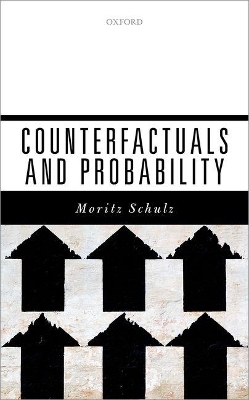
Counterfactuals and Probability
Seiten
2017
Oxford University Press (Verlag)
978-0-19-878595-8 (ISBN)
Oxford University Press (Verlag)
978-0-19-878595-8 (ISBN)
This volume explores counterfactual thought and language. We can typically evaluate counterfactual questions probabilistically, predicting what would be likely or unlikely to happen. Schulz describes these probabilistic ways of evaluating counterfactual questions and turns the data into a novel account of the workings of counterfactual thought.
Moritz Schulz explores counterfactual thought and language: what would have happened if things had gone a different way. Counterfactual questions may concern large scale derivations (what would have happened if Nixon had launched a nuclear attack) or small scale evaluations of minor derivations (what would have happened if I had decided to join a different profession). A common impression, which receives a thorough defence in the book, is that oftentimes we find it impossible to know what would have happened. However, this does not mean that we are completely at a loss: we are typically capable of evaluating counterfactual questions probabilistically: we can say what would have been likely or unlikely to happen.
Schulz describes these probabilistic ways of evaluating counterfactual questions and turns the data into a novel account of the workings of counterfactual thought.
Moritz Schulz explores counterfactual thought and language: what would have happened if things had gone a different way. Counterfactual questions may concern large scale derivations (what would have happened if Nixon had launched a nuclear attack) or small scale evaluations of minor derivations (what would have happened if I had decided to join a different profession). A common impression, which receives a thorough defence in the book, is that oftentimes we find it impossible to know what would have happened. However, this does not mean that we are completely at a loss: we are typically capable of evaluating counterfactual questions probabilistically: we can say what would have been likely or unlikely to happen.
Schulz describes these probabilistic ways of evaluating counterfactual questions and turns the data into a novel account of the workings of counterfactual thought.
Moritz Schulz studied Mathematics and Philosophy at the University of Hamburg before completing a BPhil at Oxford University. Shultz received his PhD from the Humboldt University of Berlin in 2011. Since then, he completed a post-doc at the University of Barcelona and acted as an assistant at the University of Tübingen before taking up his current role as junior professor at the University of Hamburg.
1: Introduction
2: The Problem of Evaluating Counterfactuals
3: Counterfactual Chances
4: A Puzzle About Counterfactuals
5: Restriction and Modification
6: Counterfactuals and Arbitrariness
7: Applications
8: Triviality
9: Concluding Remarks
| Erscheinungsdatum | 03.02.2017 |
|---|---|
| Verlagsort | Oxford |
| Sprache | englisch |
| Maße | 152 x 223 mm |
| Gewicht | 424 g |
| Themenwelt | Geisteswissenschaften ► Philosophie ► Erkenntnistheorie / Wissenschaftstheorie |
| Geisteswissenschaften ► Philosophie ► Sprachphilosophie | |
| Mathematik / Informatik ► Mathematik ► Wahrscheinlichkeit / Kombinatorik | |
| ISBN-10 | 0-19-878595-X / 019878595X |
| ISBN-13 | 978-0-19-878595-8 / 9780198785958 |
| Zustand | Neuware |
| Haben Sie eine Frage zum Produkt? |
Mehr entdecken
aus dem Bereich
aus dem Bereich
die Grundlegung der modernen Philosophie
Buch | Softcover (2023)
C.H.Beck (Verlag)
CHF 25,20
Buch | Softcover (2023)
Reclam, Philipp (Verlag)
CHF 9,80

![Was heißt Denken?. Vorlesung Wintersemester 1951/52. [Was bedeutet das alles?] - Martin Heidegger](/media/113619842)
